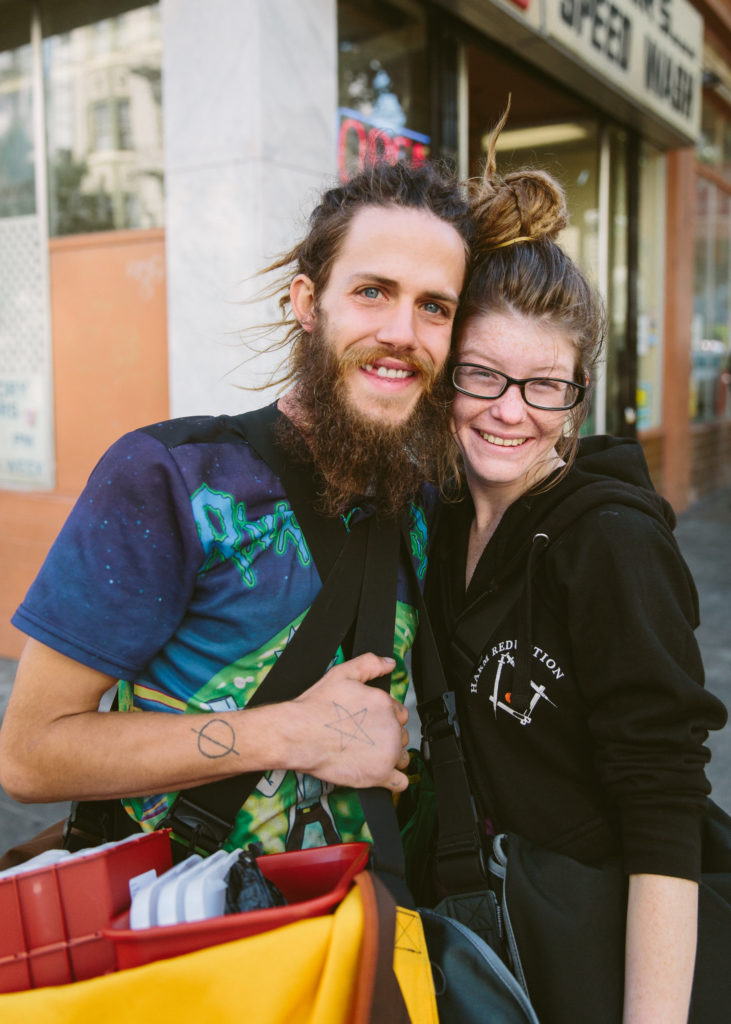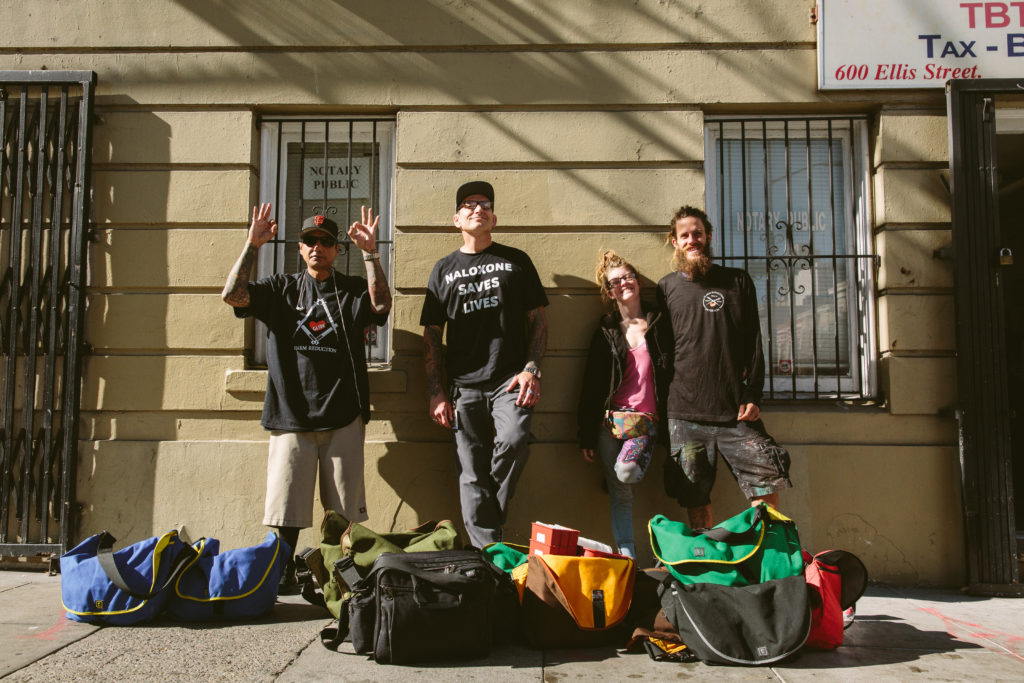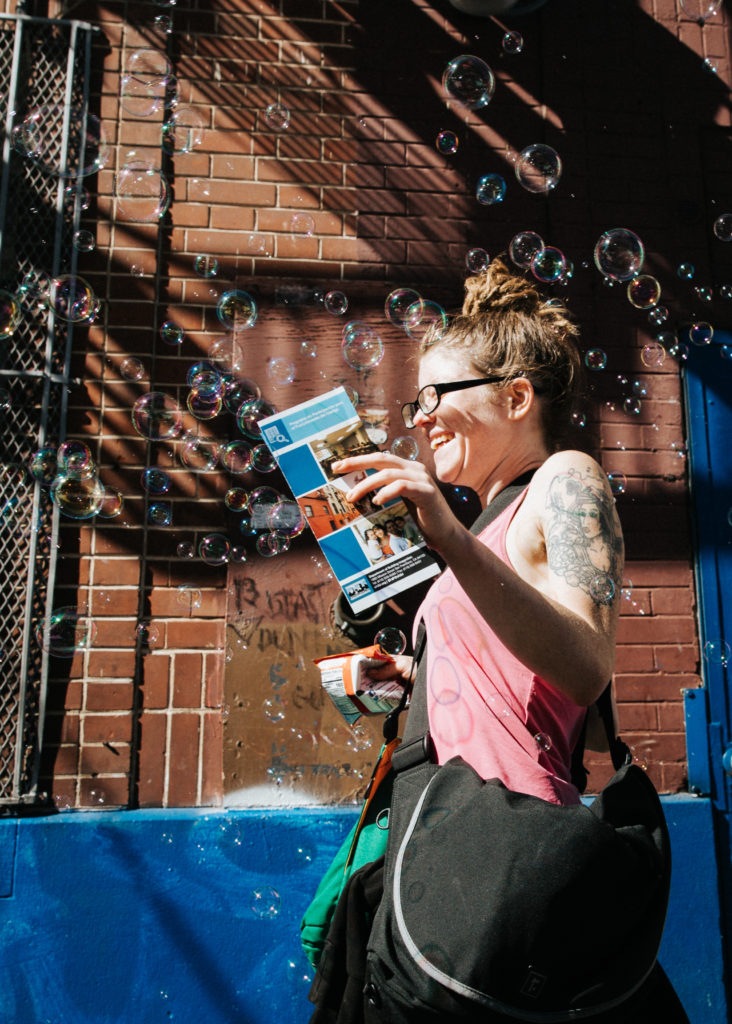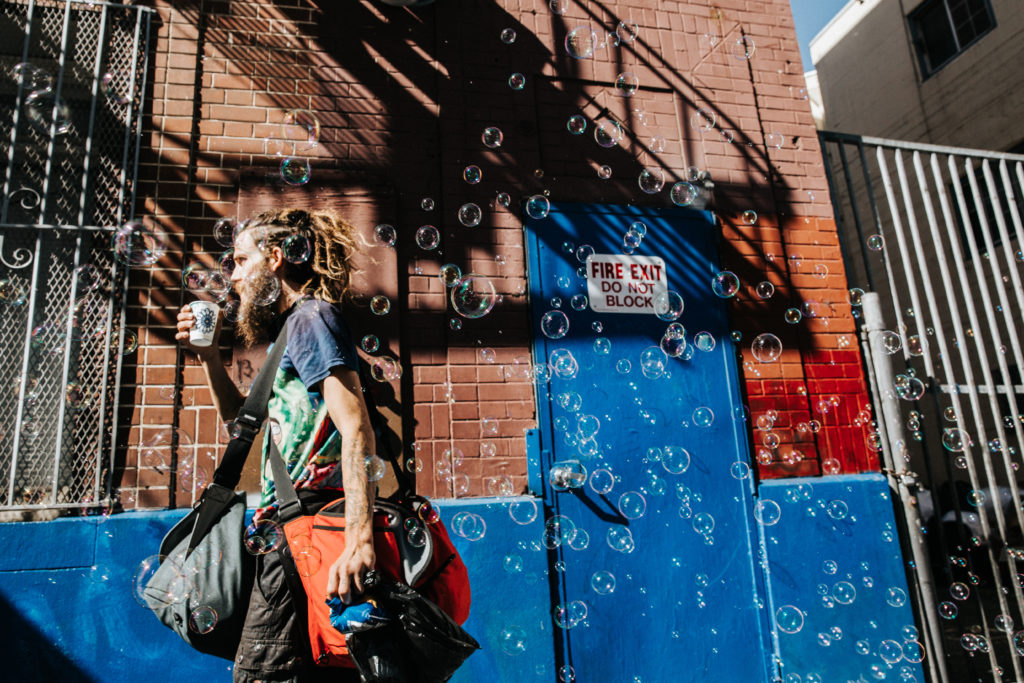It’s no secret that at GLIDE, we believe in love, We believe in radical, unstoppable, unconditional love. We also know that love manifests in as many ways as there are people in our community—people like Elena and Zach, two GLIDE interns who are helping to link hard-to-reach members of the community to harm reduction and HIV/Hep C services.

Zach and Elena are much loved members of the Tenderloin’s harm reduction community.
GLIDE Harm Reduction Peer Program: An entryway to connection, education and community
Recently, GLIDE’s Harm Reduction team initiated its first-ever Peer Program, managed by Outreach Coordinator Bill Buehlman. The purpose of the fledgling program is to provide internship opportunities to people who have struggled with substance use themselves, so that they can not only learn about harm reduction and direct service but, in turn, reach out to others in the community who are otherwise not receiving services—either because they get overlooked by other programs or they tend to distrust traditional service providers.
“We’re trying to engage people with lived experiences,” explains Bill, “active participants who want to do any level of service work.”
Bill serves as both a trainer and a mentor to participants in the Peer Program, who are usually people who currently use or have formerly used GLIDE’s harm reduction services.
“The people who are difficult to reach are the people we most want—especially with regard to Hep C testing, education and treatment. Seven out of 10 injection drug users in this city will test positive for Hep C antibodies. We are good at outreach, but that doesn’t mean we can reach everybody. That is part of what this program is about—using people within the community to navigate in there and help link folks to services.”

Another member of the Peer Program, Bill Buehlman, Elena and Zach pose together after a Friday afternoon harm reduction outreach.
Elena and Zach arrived in San Francisco last year after many years of travel, and were immediately drawn to GLIDE’s Harm Reduction Program.
“With Zach and Elena,” reflects Bill, “they really want to be in this world of harm reduction.”
Harm reduction principles are founded on respect for individuals’ choices, and a deep understanding of the often winding and difficult road to recovery. The Peer Program reflects these values by operating with a compassionate and judgment-free approach.
“As long as they can show up and do the work, that is all that should matter. And that is what Zach and Elena have done, consistently, and it’s been unbelievable.”
Elena and Zach
Elena and Zach met in a park on a hot day in Oregon, while they were both travelling independently around the country. Elena is from a small town in northeastern Ohio, while Zach is from Texas.
“We feel very strongly that people deserve clean equipment and good health care. To be in a position where we can advocate for that is really amazing because no one was ever there to advocate for us.” — Zach
“It was really special. We were both backpacking separately across the country,” recounts Elena. “I saw him and he had a Grateful Dead tapestry, which is one of my favorite bands. I had just been in Washington mining for quartz and crystal, so I had a really big case of nice shiny rocks and gemstones. I showed them to him. It’s a really odd thing to be interested in. Not many people share a love of minerals! But he did too, and so we’ve been together ever since. That was three years ago.”
Through their shared interests in music and minerals, Elena and Zach formed a strong bond. Together they grew an extensive collection of gems.
“After we met, we made that our focus, and we went on mining expeditions while we were moving around the country. You can go in any national forest or Bureau of Land Management land and you’re legally allowed to remove seven to 20 pounds of minerals every day,” Elena explains. “We have the gift of gab, so we took our cases of rocks out on the sidewalk in any city we were at and sold them on the street.”

Elena walks through the Tenderloin on a Friday afternoon outreach.
But when they arrived in San Francisco, Zach and Elena committed fully to volunteering at GLIDE. Today, they help run our Syringe Access Services, lead community outreach and needle sweeps, and were sponsored by GLIDE to become certified as Hep C/HIV test counselors.
“We were the first peers that Paul [Harkin, Director of GLIDE Harm Reduction Services] sent to become certified,” says Elena with justifiable pride.
“We’ve both had our fair share of experiences in places where there was no harm reduction,” adds Zach. “We feel very strongly that people deserve clean equipment and good health care. To be in a position where we can advocate for that is really amazing because no one was ever there to advocate for us. We’ve definitely needed these services, and we definitely used them all when we first got to San Francisco.
“We’ve since straightened our lives out in a different way, so we’re not using every day, but there was a point when we were using three, four, five times a day, coming here for supplies and hitting GLIDE up when they were on outreach.”
“The people around us are extremely supportive of what we’re going through, and that’s amazing. I couldn’t do it without them, and especially not without Zach.” — Elena
“Now, we’re actually providing the services that we used to come here to get ourselves. That really adds to our passion for it,” says Zach. “If it wasn’t for these guys, we wouldn’t have gotten the things we needed.”
Elena and Zach speak candidly but thoughtfully about their relationship with drugs over the years. Elena struggled with opioids for six years, and other substances before that.
“There were times when I was off and on, but there wasn’t any time when I was off that I wasn’t thinking about being on,” she says. “I’m dealing with 15 years of depression right now, in this time of transformation. The people around us are extremely supportive of what we’re going through, and that’s amazing. I couldn’t do it without them, and especially not without Zach.”
As for Zach, he has been injecting drugs for over three years, but says that he has been doing opiates since he was in his early teens.
“I remember a specific point in my youth when I decided to steal a bottle of Jack Daniel’s out of my dad’s closet. I was on opiates soon after that,” he explains. “I got addicted to drugs because I have problems that I’m trying to cope with.”
Now, Elena and Zach are studying for their Community Health Worker Certificate at the Community College of San Francisco (CCSF), and both intend to pursue BA degrees afterwards.
“I was concerned about going to school while homeless, but it’s been good. The teachers are supportive,” says Zach. “We are slowly moving forward in our lives.”
Elena plans to develop a strong application for UC Berkeley through her extensive harm reduction experience and CCSF coursework. Her goal is to have a profession in clinical research for an organization that focuses on the mental health benefits of controlled use of psychedelic medicines, such as psilocybin and MDMA.
“I’m interested in studies looking at these substances being used to treat depression and PTSD, and LSD being used for alcoholism and other disorders. The FDA is approving things that we never thought would be approved. That’s the field where I would like to see myself in eight to 10 years,” Elena says.
Zach wants to continue his education and work in harm reduction as well.
“I look forward to getting into a position where I can help troubled kids find their path and stay out of trouble because that is where I was when I was a kid. No one could relate to me, no one tried to relate to me. I really want to be that somebody that kids can relate to and help them find a good productive path,” he says.

Zach carries harm reduction supplies for distribution in the Tenderloin.
Radical love
As with any recovery journey, Zach and Elena’s love story is far from a fairytale. They have faced relapse. They are technically unhoused, currently living in a navigation center and unsure of where they will find a roof at the end of the month. And, while they thankfully have free tuition at CCSF, they still need to find affordable ways to access readings for their courses, purchase food and navigate complicated government systems to ensure they stay housed, healthy and safe.
Through all of this—years of substance use, mental health issues and financial insecurity—they have maintained their love for each other and for the community they serve. Their ongoing story is a testament to the power of unconditional love to not only transform individuals but whole communities and society at large. It is no small coincidence that harm reduction approaches are simultaneously the most effective and the most compassionate ways to address substance use disorders.
“GLIDE has helped me in ways that no one else ever has,” Zach said.
Elena agrees.
“I don’t think I’d be where I am at without these people at GLIDE,” she says. “Working here is the most amazing thing that’s ever happened to me in my entire life. They took me as I was—and look at the work I’ve been able to do.”